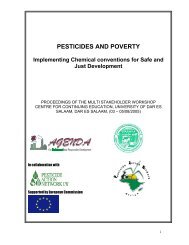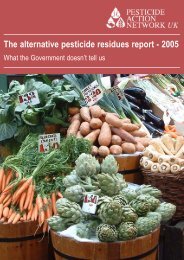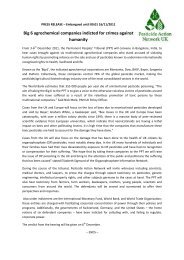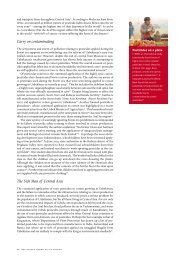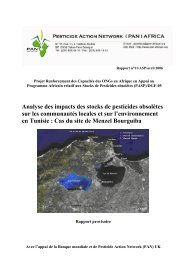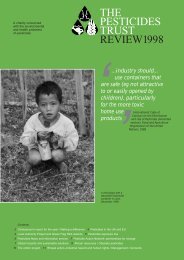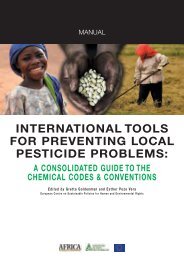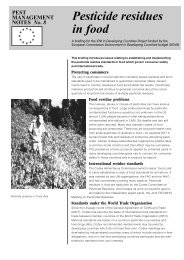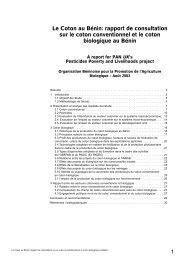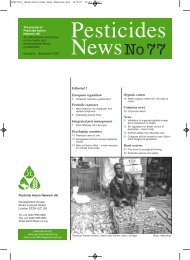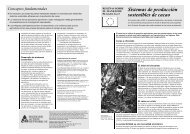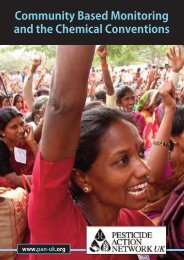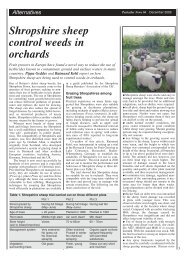Your Daily Poison - Pesticide Action Network UK
Your Daily Poison - Pesticide Action Network UK
Your Daily Poison - Pesticide Action Network UK
Create successful ePaper yourself
Turn your PDF publications into a flip-book with our unique Google optimized e-Paper software.
18<br />
6. Introduce and publish, as part of the<br />
national pesticides strategy, standardised<br />
national protocols for the selection of<br />
laboratory analyses of pesticides in food,<br />
water and air, for the use of water<br />
companies, local authorities, the Drinking<br />
Water Inspectorate, the <strong>Pesticide</strong> Residues<br />
Committee, and academic and research<br />
institutions engaged in this work.<br />
7. Review the approvals of pesticides which<br />
are repeatedly detected in water supplies,<br />
or detected after a specific number of<br />
occurrences, and if residues in water<br />
cannot be avoided their approval should be<br />
revoked.<br />
8. Provide opportunities for public consultation<br />
in decision-making about the extent of<br />
testing and its resourcing. There should be<br />
a window for public consultation in the<br />
approvals process for every pesticide, as<br />
there exists for genetically modified<br />
organisms.<br />
9. Oblige agrochemical and veterinary<br />
medicines companies trading in <strong>UK</strong> to<br />
disclose full details and data from tests<br />
conducted on human subjects of any<br />
substance approved in the <strong>UK</strong> anywhere in<br />
the world since 2000, so that their ethical<br />
and scientific implications can be<br />
scrutinised by policy-makers, parliament,<br />
and the public, and regulatory control<br />
introduced.<br />
STRENGTHEN POST-APPROVALS HUMAN<br />
HEALTH SURVEILLANCE<br />
10. Act on the Royal Commission’s<br />
recommendations and to introduce an<br />
effective surveillance scheme for pesticide-<br />
related disease, to be run by the Health<br />
Protection Agency (HPA) (and the<br />
equivalent organisations in the devolved<br />
administrations), the cost of which<br />
(estimated at £5-10 million per year) should<br />
be covered by a levy on pesticides sales.<br />
The HPA and related organisations in the<br />
devolved administrations should collect<br />
population data on pesticides and other<br />
chemicals and their biomarkers suspected<br />
to cause chronic diseases. A national<br />
pesticide and chemical exposure database<br />
should be initiated.<br />
11. Press within the European Parliament and<br />
Commission for a Europe-wide biological<br />
monitoring programme of pesticides and<br />
chemicals in humans, in conjunction with<br />
the Health Protection Agency’s remit above.<br />
12. Implement a programme of primary<br />
prevention of diseases linked with<br />
pesticides — including cancer and also<br />
neurological disease, reproductive disease,<br />
immunological disease, respiratory disease,<br />
and skin disease — through a national<br />
programme of exposure reduction to toxic<br />
substances and the adoption of an<br />
adequately funded and supported toxics<br />
use reduction strategy, including a<br />
programme to phase out pesticides which<br />
are known to be relatively hazardous.<br />
PROVIDE PUBLIC INFORMATION<br />
13. Give residents, walkers, and all other<br />
countryside users the right to know what<br />
pesticides they are being exposed to by<br />
introducing mandatory notification of use<br />
both in advance and with signs on site.<br />
14. Initiate a scientific and public debate on the<br />
potential benefits of reduced chemical use.<br />
<strong>Your</strong> daily poison



